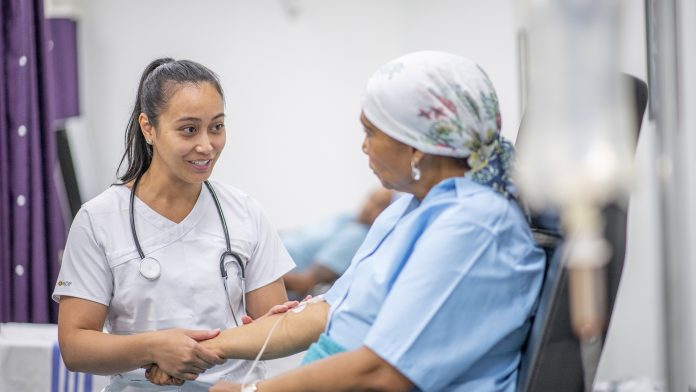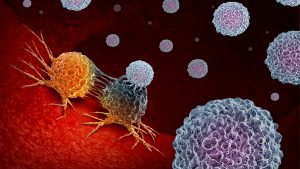
Denis Lacombe, CEO of the EORTC, explores the challenges facing cancer research, and how the organisation is working to optimise cancer treatment.
Cancer is the second highest cause of death in Europe, with more than 3.7 million new cases and 1.9 million deaths each year. Because cancer affects so many people in Europe, and around the world, there is a need for further innovation in oncological research and treatment, with a key aim of minimising the negative side effects that are inherent of many current cancer treatment methods.
Denis Lacombe is the CEO of the European Organisation for Research and Treatment of Cancer (EORTC). The EORTC aims to establish cancer treatment optimisation, advocating the optimal use of medicines to ensure that patients receive the best possible care. Treatment optimisation focuses on achieving the best clinical outcomes through minimising toxicity of common cancer treatment methods and lowering the patient burden, whilst also increasing cost-effectiveness. Health Europa spoke to Dr Lacombe about the benefits of a patient-centred approach and the importance of connecting key stakeholders in cancer care to improve the sustainability of healthcare systems.
What are the key aims of the EORTC and what role does it plays within the wider European care landscape?
The EORTC plays an important role, not only in Europe, but in the global healthcare landscape. As part of our global agenda, and in partnership with other organisations including the National Cancer Institute (NCI) in the US, we address central questions that are critical to improving the standard of care for cancer patients and address associated challenges in a multidisciplinary fashion.
In order to treat and beat cancer and establish effective strategies, we need to adopt a multidisciplinary approach whereby we discuss and expand our knowledge of cancer treatments -including drugs, radiation oncology and surgery – but also the biology of the disease. Such discussions can be facilitated by the EORTC.
When drugs are available, discussion should be facilitated around how to optimally use these drugs in scientific strategies, how these drugs should be used alongside radiation oncology for instance and how to combine drugs across manufacturers. The EORTC fulfils an agenda of understanding available therapeutic strategies to meet the needs of the patient.
As a not-for-profit organisation, our mission is about supporting the survival and quality of life of cancer patients and over the years, we have done this through the delivery of datasets. In the not-for-profit sector, our actions and agendas go much wider than what is supported by governments or the commercial sector.
How important do you think cross-border collaboration is in cancer research and treatment development?
It is hugely important because we want to ensure we are gathering as much information as possible. When research is carried out at international level, the findings can be more easily implemented by those who have contributed and reach even more patients.
There are many challenges in cancer research, for example finding treatments for rare cancers. Clinical trials and research have helped us understand the importance of focused patient populations. For instance, we used to think lung cancer was a singular disease, but we now know it is multiple diseases depending on the genomic alterations.
If we want to assemble sufficient solid data, we need to collaborate. It is a matter of accessing patient knowledge, adapting to rapidly changing knowledge, and ensuring that this knowledge and progress is disseminated as fast as possible. Perhaps the most important point is that we should make research and innovation available to patients wherever they are.
Aside from the pandemic, what are the most pressing challenges currently facing cancer research and treatments?
A key challenge for the EORTC at present is ensuring our scientific agenda is accessible to all and sustainable across Europe. As such, we are focused on raising awareness among key stakeholders across Europe to ensure our patient-focused agenda is sustainable and can be widely implemented. Our organisation is working hard to overcome the complexity of the regulatory environment and the difficulty in reaching patients during the pandemic.
Can you outline what the treatment optimisation approach looks like and what are the key challenges restricting this kind of approach?
Treatment optimisation is a means of collaborating with the commercial sector, for example, to ensure drugs are developed with the patient in mind, as opposed to merely focusing on commercial interests. As part of this patient-centred approach, we need to be addressing key questions that will help to give patients the best possible outcome and quality of life. As such, we need to consider how different therapies are combined, the duration and de-escalation of treatments to potentially reduce the level of toxicity for patients. These questions are part of the important treatment optimisation agenda.
This approach may not be in the best interest of the commercial sector, as if you are reducing duration times of cancer treatments, they potentially lose profits. However, our organisation believes that it is critical that the patient is put first.

If it can be demonstrated that you can cut down treatment duration or spare the patient population from receiving aggressive cancer treatments, patients will be positively affected. Treatment optimisation puts the patient first, as well as reducing the burden on overstretched healthcare systems.
What further action do you think could be taken at a policy level to further support cancer research and improve treatments for patients?
At both the European and international level, we are trying to improve the visibility of treatment optimisation and clinical research. In order to do so, we believe that we must reengineer part of the system. Currently, we are discussing with regulators, such as the European Medicines Agency, that when a new technology becomes available, the critical questions around patient optimisation, patient population, or treatment duration, need to be addressed.
There will be international mechanisms where efficient ways of carrying out trials and research can be offered to patients. Datasets can be delivered more rapidly to doctors so that when they treat a patient, they can tell them how many months of treatment, if any, they will need for the treatment to be beneficial and effective, based on solid evidence.
Currently, the process of getting the drugs to patients – market authorisation and reimbursement – relies on commercial datasets that contribute to registration and access. Although the agenda of the EORTC is not yet subscribed to an official process, we believe that we have a role to play to inform the patient and inform society. It is very important that datasets are available to the public, society, and to stakeholders who need these datasets to make decisions.
Are there any recent developments or innovations that have improved the success rate of cancer treatment in recent years that you want to highlight?
In the last 10 years, we have seen progress in immuno-oncology which has been a game changer in the way we treat patients. Yet, the optimal duration for immunotherapy is not known and the biomarkers based on which we administer immunotherapy are not well defined. There is a lot of work needed to optimise this cancer treatment, as not having the answers to critical questions 10 years on has had, and will continue to have, a direct impact on patients and on society.
In Europe, there is no obvious mechanism for how we can implement a treatment optimisation type of approach. It is becoming more challenging due to the cost of drugs. We understand that it is not cheap, but the commercial sector will not support a de-escalation type of project. We need to understand how we can make these research programmes feasible in a very efficient manner, in Europe and worldwide.
The EORTC is building on existing infrastructure, and the current solutions must be adapted to the changing environment. We have 60 years’ experience of performing clinical trials and delivering progress. All of the expertise available in Europe needs to be identified and brought together so that we can deliver excellent, rapid treatment for cancer patients.
A selection of EORTC practice-changing cancer clinical trials
- EORTC Brain Tumour Group study: Introducing personalised treatment for brain cancer. (EORTC 26981/22981)
- EORTC Breast Cancer Group MINDACT study: Using gene signatures to determine optimal treatment in early breast cancer. (EORTC 10041)
- EORTC Soft Tissue & Bone Group study: Setting the standard of treatment in GIST patients (EORTC 62024)
- Preserving natural speech in cancer of the head & neck with larynx-preserving radio-chemotherapy. (EORTC 24891)
- EORTC Genito-Urinary Group PEACE III study: Investigating the effect of adding bone-protection to chemotherapy for prostate cancer.(EORTC-1333)
- EORTC-LYSA-FIL Lymphoma Intergroup study (H10): Treatment optimisation for Hodgkin Lymphoma: towards increasing efficacy or sparing toxicity, depending on each patient’s early response to treatment. (EORTC 20051)
- EORTC Melanoma Group study: Prolonged survival in stage III melanoma – with ipilimumab adjuvant therapy. (EORTC-18071)
- EORTC Brain Tumour Group PersoMed-I study: Investigating personalised therapy options in rare brain cancer (EORTC 1634)
Denis Lacombe CEO European Organisation for Research and Treatment
of Cancer
www.eortc.org
https://www.linkedin.com/in/denislacombe/?originalSubdomain=be
https://www.facebook.com/EORTC/?ref=nf&hc_ref=ARR8cqdYYNnIJXwOHHvfdf4kvhgOXZ0oIhkv8JcRKWncr_In0UhUVAGeHuVBSJ9L9Gk&__tn__=%3C-R
This article is from issue 20 of Health Europa Quarterly. Click here to get your free subscription today.







